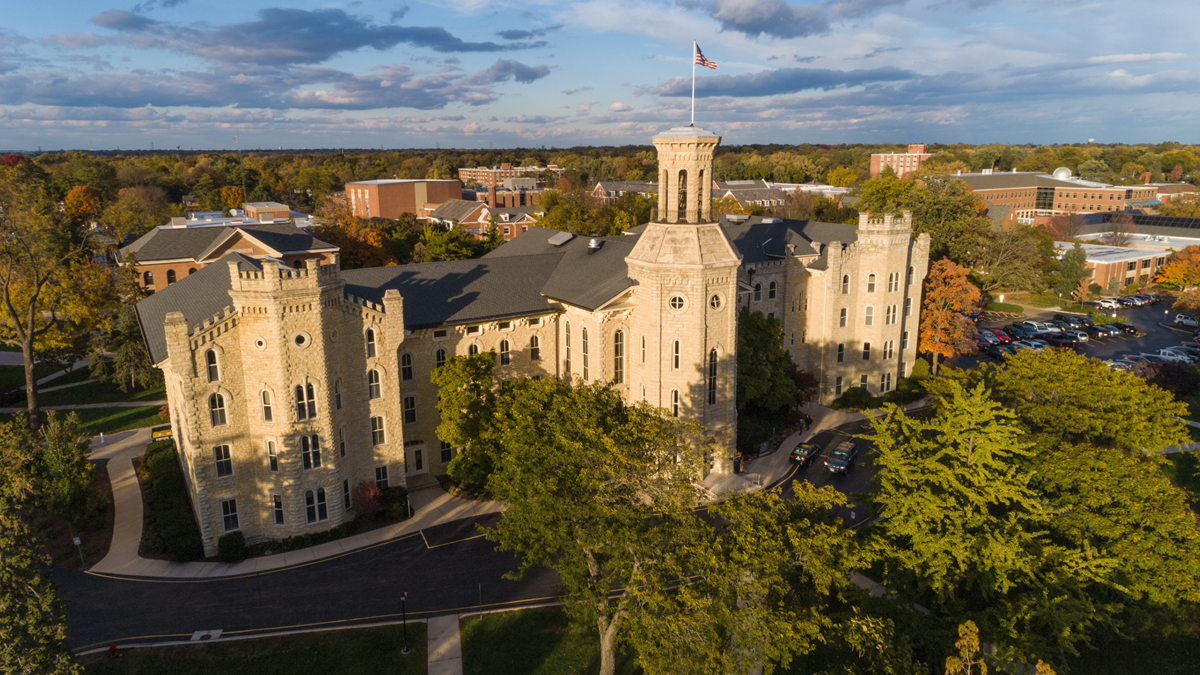Wheaton College embraced racist attitudes that “created an inhospitable and sometimes hostile campus environment for persons of color,” according to a 121-page review of the school’s history released by trustees today.
Though the flagship evangelical institution was founded by abolitionists, over the next century and a half it turned away from concerns about racial equality. Even when the school’s leadership knew what was right, they frequently lacked the courage to “take a more vocal role in opposing widespread forms of racism and white supremacy,” the report says, and too often “chose to stay silent, equivocate, or do nothing” about racial injustice.
“We cannot be healed and cannot be reconciled unless and until we repent,” the task force concluded at the end of an 18-month study. “These sins constituted a failure of Christian love; denied the dignity of people made in the image of God; created deep and painful barriers between Christian brothers and sisters; tarnished our witness to the gospel; and prevented us from displaying more fully the beautiful diversity of God’s kingdom.”
President Philip Ryken told CT he believes the report is important and he’s glad the college will be making it publicly available.
“The record of the people of God, in so many ways, is a record of their failures as well as their successes,” he said. “I think we can be more effective in living for Jesus Christ today if we’re aware of the challenges that our brothers and sisters have faced in the past and how they have responded to the challenges and opportunities of their day.”
The historical review was conducted by a 15-member task force of trustees, faculty, staff, students, and alumni. Led by trustee Dale Wong and archivist Katherine Graber, they reconstructed the history of race relations from Wheaton’s founding in 1853 up to the year 2000. The school was started by abolitionist John Cross and then reorganized and renamed by Jonathan Blanchard, who was one of the first ministers to urge president Abraham Lincoln to “let the oppressed go free.”
After that, though, the record was not always stellar. Wheaton leadership showed little concern for Black people in the years after the Civil War, hired no nonwhite faculty, and enrolled only a few nonwhite students, the report found. Minority students who did attend faced overt racism, including students refusing to live or eat alongside them and school-sanctioned blackface performances.
By the 1920s, Wheaton had surrendered any claim to a countercultural position on race, according to the task force report. A new president, J. Oliver Buswell, stopped admitting Black students altogether in 1926. Privately, Buswell said he didn’t think integration was immoral, but he was concerned about too much “social contact” between races.
“I have been trying to dodge this issue,” he wrote to a friend toward the end of his presidency. “I am inclined to think that it would be better in a practical way if colored people would go to their own colored schools.”
Thirty states had laws against interracial relationships at the time, and the US considered amending the constitution to make what was then called “miscegenation” a federal crime. The Wheaton task force noted, however, that Christians should not accept arguments that Buswell and others were just “men of their time.” Historical context is not an excuse for failing to stand up for biblical ideals of equality and human dignity, it said.
“Our goal,” the task force wrote, “is to remind our readers—and ourselves—of how easily our fallen world can shape each of us into its mold.”
Dale Wong, one of the chairs of the task force, said the deep dive into the historical record was sobering.
“We are proud of our history at Wheaton,” he said, “and it’s difficult to understand how that original vision, from that founding by abolitionists, was lost, and how we fell into going along with the culture. That’s something I think we have to deal with.”
The task force found some positive episodes in Wheaton’s history of race relations as well. On several occasions, harkening back to its abolitionist founding, the school sharply broke from culturally accepted racism. During World War II, for example, Wheaton agreed to enroll Japanese and Japanese American students who were facing internment. By 1944, there were more than 20 Japanese students taking classes at the evangelical institution.
President V. Raymond Edman, who took the helm in 1940, also started admitting Black students again around that time and asked the anthropology and sociology department to study race relations on campus. The faculty commission wrote a five-page report in 1960. It strongly rejected any scientific basis for racial hierarchies and called on the college and evangelicals more generally to reject racial discrimination. The anthropology and sociology professors specifically wanted the school to hire Black faculty, recruit minority students, and accept interracial marriages among students.
If implemented, the proposals “would have made Wheaton College a leader among Christian institutions in its rejection of racial prejudice and pursuit of kingdom diversity,” the task force said. Instead, Edman and other Wheaton leaders decided to suppress the report. It was not released.
The school did not hire its first Black full-time professor until the 1980s. It would not make student body diversity a priority until the 1990s.
“Based on the careful research in this historical review, tested against the perfect standard of the Word of God and the high moral calling of a Christ-centered community, we also see specific areas where we need to repent as an institution,” the task force said.
The report cites the Bible’s calls to corporate repentance and lamentation over sin and injustice, including the failures of past generations, citing Isaiah 59:12, Jeremiah 14:7, and Daniel 9:16. It also recommends concrete actions.
The trustees have agreed to some immediate practical steps, starting with a change to the name of the school’s library, which currently honors Buswell. The trustees have instructed the administration to remove his name from all signs and set up a permanent display explaining the history of the school’s discriminatory enrollment practices.
The trustees have also pledged to remain “alert for unjust situations from our history and to pursue relationships where a more complete reconciliation and mutual blessing through repentance may be realized.”
That will involve ongoing assessment of the resources provided to minority students, as well as dialogue with the Lakota Sioux over the college’s ownership of the Black Hills Science Station in South Dakota, which sits on land the Lakota say was stolen. The trustees have advised the administration to “consider biblical approaches to this sensitive and complex issue” and “seek to understand Lakota views of a just remedy.”
The school will also encourage continued collaboration and reconciliation with the Potawatomi, who were forcibly removed from their homes after the federal government under Andrew Jackson declared the land that would later become Wheaton College to be terra nullius, or “nobody’s land.”
Wheaton’s review, which was commissioned in October 2021 and released to trustees in March of this year, follows similar self-interrogations taking place at secular and Christian schools across the country. Many older institutions have recently worked on public acknowledgements of the ways they benefitted from slavery.
Brown University put out a self-critical historical study in 2006, followed by similar efforts at Emory University, the University of Virginia, the University of North Carolina at Chapel Hill, and Harvard University. The Southern Baptist Theological Seminary in Louisville issued a report in 2018 chronicling its historic ties to slavery and defenses of white superiority. Princeton Theological Seminary in New Jersey released a historical audit in 2019. Georgetown University, founded by Jesuits, established a “reconciliation fund” giving $400,000 annually to help the descendants of the people enslaved by the Catholic brothers in Maryland.
Historian Anthea Butler, author of White Evangelical Racism, said she is always skeptical of evangelical efforts to reform themselves, but she’s still encouraged by Wheaton’s effort.
“If you spend this much money and time on a report, you’re serious,” Butler said. “I don’t know if evangelicalism can be saved from its racism, but I commend them, and I really hope they are ready to face the backlash from folks who say this is ‘woke.’”
Wheaton previously revised the wording on a plaque honoring missionary martyrs Jim Elliot and Ed McCully, two Wheaton alumni who died attempting to reach an Indigenous people group in Ecuador. The original campus memorial called the Woarani “savage indians.”
The revision was supported by Kathryn Long, an emerita history professor at Wheaton and the author of an acclaimed study of the missionaries.
“Their actions took place at a certain point in time,” she said. “But we don’t want to leave them there.”
Wheaton has planned town halls for students, faculty, and staff to discuss the task force report tomorrow, followed by more conversations next week, a question-and-answer session for alumni over homecoming weekend, and a symposium in October.
Ryken said he doesn’t know how people will respond to the report, but Christians have to wrestle with their history and be honest about their moral failures.
“Sometimes you see the glory of God more clearly in his redeeming grace for fallen sinners,” he said. “We have lots of examples in Scripture of the people of God wrestling with their past and seeking to understand their past, in some cases celebrating, but also lamenting and repenting. There is a complexity about the past that the Scriptures do not back away from but lean into. And that’s what we want to do too.”




























![[Video] More – Aghogho » GospelHotspot](https://gospelhotspot.net/wp-content/uploads/2024/04/More-Aghogho.jpeg)
















